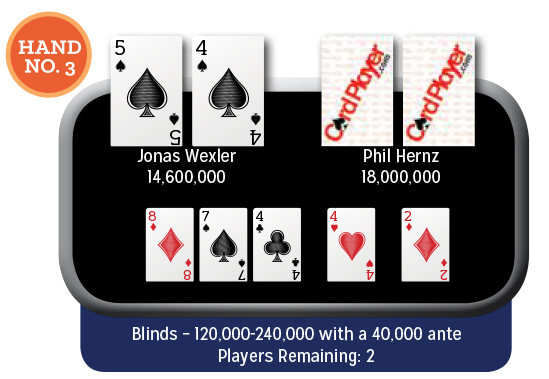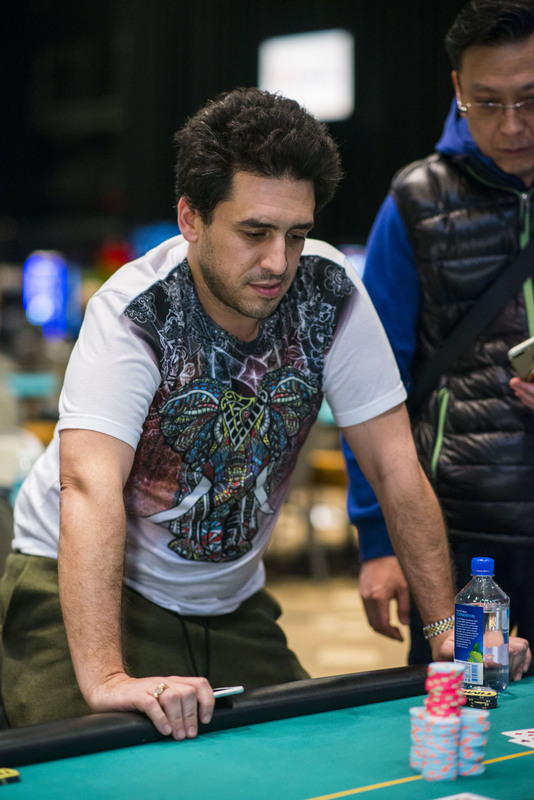






Final Table Takedown: Jonas Wexlerby Steve Schult | Published: Jun 05, 2019 |
|
|

Jonas Wexler is a veteran on the tournament poker circuit. The 40-year-old pro has been a force on the East Coast with cashes dating back 2006 up and down the Atlantic and in Las Vegas at World Series of Poker events.
Wexler took down the WSOP Circuit Cherokee main event a few weeks ago for his second Circuit ring and the largest score of his career. The Philadelphia-area native scored $300,536 for his victory and saw his career earnings climb to more than $1 million.
Wexler sat down with Card Player to take us through his thought process from key hands at the final table.
.jpg)
Concepts: Betting the river for thin value
The Action: Jonas Wexler raised to 350,000 on the button and Spencer Champlin called out of the big blind. The flop was Q Q
Q 5
5 and Champlin checked. Wexler checked behind. The turn was the 5
and Champlin checked. Wexler checked behind. The turn was the 5 . Champlin checked again and Wexler bet 220,000. Champlin called. The river was the 8
. Champlin checked again and Wexler bet 220,000. Champlin called. The river was the 8 and Champlin checked. Wexler bet 500,000 and Champlin called.
and Champlin checked. Wexler bet 500,000 and Champlin called.
Steve Schult: What are your thoughts on Spencer’s big blind defense range? What did you think you were going to be up against preflop?
Jonas Wexler: I expected Spencer to defend probably any suited hands from what I had seen from him. I didn’t think he was going to fold anything suited preflop and pretty much anything close to making a straight such as 6-4 off and 3-5 off. I think he would call with all of these hands, especially when he’s closing the action.
I expected his range to be pretty wide. Also, from what I had seen, I hadn’t seen him get crazy out of line post-flop or anything like that.
SS: On a paired board with a flush draw, you decide to check it back when Spencer checks to you. What is your reasoning behind checking the flop instead of betting to protect your equity and get value from worse hands?
JW: I’m trying to remember for sure what all of the stacks were. I’m pretty sure two of them were between 10-15 big blinds and I was just trying to play pot control. Also, I can be somewhat deceptive with my hand.
A lot of the time he is going to have two unders and I’m just giving him a chance to make a pair. Besides the spades, the board is pretty dry. If he has spades, he has spades and is never folding. So I don’t know how much I’m protecting against by betting small here.
SS: I’m assuming your bet on the turn is a value bet. What hands are you trying to get value from?
 JW: Now I’m just thinking any of his middling pairs and possibly any ace-highs or king-highs that he would call with for his price.
JW: Now I’m just thinking any of his middling pairs and possibly any ace-highs or king-highs that he would call with for his price.
SS: Could you ever have ace-high here yourself? Or would you have played that differently? Would this be a line you would take if you were trying to fold out a chop between two ace-high hands?
JW: Yeah. Because I just don’t think you’re going to get it done with one bet. So if you are trying to fold out ace-high you are going to have to bet the turn and the river. I would definitely bet some of my ace-highs too on the flop, maybe with some backdoor flush draws possibly.
SS: When he calls the turn, do you think there is any chance he could still have a flush draw? Or are you eliminating those hands from his range?
JW: I would think so. He may have led the turn with some of his flush draws too, though.
SS: On the river, when you bet, which hands are you hoping will call you? What are your thoughts on your river bet?
JW: At this point, I really just felt he had… well, not what he had. I thought he had sixes or sevens or something and I wanted to give him a good price where he would have to call.
I also just wanted to bet something where I could easily fold if I got raised. I didn’t think he would check-raise me too often as a bluff.
.jpg)
Concepts: Playing small pots because of ICM considerations
The Action: Phil Hernz raised to 450,000 from the small blind. Jonas Wexler called from the big blind and the hand was checked down.
SS: What made you choose to just call with A-J against what I gather is a pretty aggressive player?
JW: We were first and second in chips at this point in time. Phil was aggressive preflop a little bit. I don’t know how out of line he would be getting that I would ever want to three-bet and call here if he found a four-bet.
I wanted to keep all of his worse aces in. I didn’t want to three-bet and then have to make a decision. I didn’t want to three-bet and fold. I didn’t want to give him an opportunity to own me with hands worse than mine. So mainly this was an ICM decision. If stacks were much closer, things could have been different and I might have been looking to get it in here. But us being one and two and me having position the whole hand, I felt like I’d probably played more hands than Phil lifetime and I thought I had a little bit of an edge on him.
SS: Is this a spot where you would pick a more polarized three-bet range with some really good hands and some really bad ones where you don’t feel awful folding? Or are you just going to be calling with most of your range?
JW: I’m probably not going to have much of a three-betting rang here just because I don’t expect Phil to try and ICM screw me. I think I would even flat most of my big hands here and occasionally three-bet aces and kings. I would probably three-bet queens and maybe some really small pairs that I would just three-bet and fold. For the most part, I would just be flatting.
SS: Why did you choose not to turn your hand into a bluff at any point post-flop?
JW: It just felt way too strong. Just felt like I was going to tap the table and win a lot. It didn’t feel necessary. I saw there was a hand earlier where Phil made a pretty ridiculous hero call with king-high, so I knew that I probably wasn’t going to be bluffing out many worse hands on the river or anything like that. I was just happy to get to showdown.

Concepts: Realizing your equity in position
The Action: Jonas Wexler raised to 600,000 on the button and Phil Hernz three-bet to 1,400,000 out of the big blind. Wexler called. The flop was 8 7
7 4
4 . Hernz bet 2,500,000 and Wexler called. The turn was the 4
. Hernz bet 2,500,000 and Wexler called. The turn was the 4 and Herz bet 4,500,000. Wexler called. The river was the 2
and Herz bet 4,500,000. Wexler called. The river was the 2 and Hernz checked. Wexler moved all in for Hernz’s remaining 9,500,000 and Hernz folded.
and Hernz checked. Wexler moved all in for Hernz’s remaining 9,500,000 and Hernz folded.
SS: How frequently had Phil been three-betting you in this heads-up match?
JW: This was probably the second or third time that he had three-bet me. It was very infrequent. Almost all of my raises were getting through. So I pretty quickly felt he was a little inexperienced with heads-up. He wasn’t raising as often as he should’ve been.
I’m just not folding for 800,000 more. Especially when his range, in my mind, is very weighted towards the nuts. I think he has a lot of big hands when he three-bets me for the first time in like 30 hands or whatever it is. Especially when he goes with this sizing. I’m deep enough where I just need to see three and go from there.
SS: From a theory perspective, this is a better flop for your hand than his. So with that in mind, did you ever think about turning your hand into a semi-bluff with bottom pair and a gutshot to try and blow him off pocket tens or something?
JW: No, I just think he would happily get all of his overpairs in on the flop. So I didn’t really want to blow it up.
SS: How wide are you going to be floating this flop? What’s your general plan of attack here with your entire range?
 JW: I would float here with like J-10, possibly Q-J with a backdoor flush draw. I probably would have just given him the pot. I really thought he had it here on the flop, just from his tendencies so far.
JW: I would float here with like J-10, possibly Q-J with a backdoor flush draw. I probably would have just given him the pot. I really thought he had it here on the flop, just from his tendencies so far.
SS: You obviously turn gin with trips and he bets again. Combined with your preflop read and the double barrel on a board that would be hard for him to connect with, would you ever raise right there on the turn?
JW: I thought about it. I also thought I might give him a chance to make a hero fold by raising there. I just wanted to give him a chance to bluff it off in case he had A-K and was just going wild.
SS: When he checks the river, it looks like he’s giving up. Is that an accurate assessment? Do you think he has an overpair at this point?
JW: I thought he was giving up at this point most of the time. I thought he would just continue with his overpairs.
SS: Why shove then? Why not just bet something ridiculously small and hope to get him to move in?
JW: From what I had seen out of him, he was usually giving up and when that was the case, I expect him to fold whether I shoved or I bet 20 percent of the pot. I just thought when he was giving up, he was giving up regardless, so I figured the times he had something that wanted to get to showdown I would get max value.
Features
The Inside Straight
Strategies & Analysis
Commentaries & Personalities